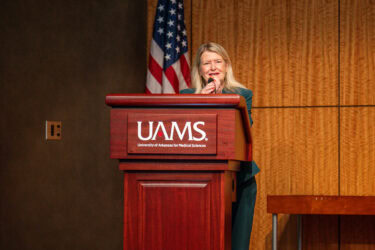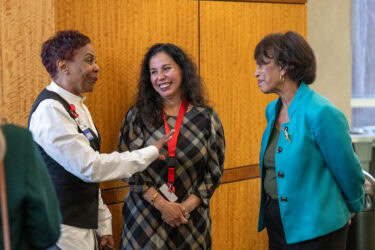View Larger Image

Beverly Malone, president and CEO of the National League for Nursing, discusses the “power of caring” during her lecture at the University of Arkansas for Medical Sciences.
Image by Bryan Clifton
National League for Nursing CEO Visits UAMS for Lecture on Leadership, Caring
| Beverly Malone, Ph.D., RN, president and CEO of the National League for Nursing, shared her thoughts on the importance of leadership and the “power of caring” during a recent lecture hosted by the University of Arkansas for Medical Sciences (UAMS) College of Nursing.
The Nov. 4 event was part of the College of Nursing’s Claudia Beverly Lectureship in Nursing Leadership, which brings in national leaders to share their efforts to advocate for excellence in nursing education, practice and research. Claudia Beverly, Ph.D., RN, is a professor emerita at UAMS and a former director of the university’s Hartford Center of Geriatric Nursing Excellence.
Malone addressed dozens of nursing students and faculty members in the Fred Smith Auditorium of the Jackson T. Stephens Spine & Neurosciences Institute, encouraging them to consider the “North Star” in their clinical mission.

Patricia Cowan, dean of the UAMS College of Nursing, introduces Beverly Malone as part of the college’s Claudia Beverly Lectureship in Nursing Leadership.Image by Bryan Clifton
“Sometimes you need to look up at that North Star just to help you get where you want to go,” she said.
Malone said the National League for Nursing, a professional association for faculty nurses and educational leaders, has long strived to promote excellence in nursing education and to build a strong and diverse workforce. As the organization’s chief executive since 2007, Malone has expanded its mission statement to emphasize the goal of advancing “the health of our nation and the global community.”
“All roads lead to quality patient care,” she said. “We’re teachers and educators, but we can’t lose sight of what’s important.”
Malone recommended that nurses also build a strong set of core values to guide their interactions with patients and colleagues. The National League for Nursing’s core values highlight the importance of caring as an action that promotes health, healing and hope.
“I think every nurse should carry a self-generating mechanism of hope with them at all times,” she said.
When she began her nursing education, Malone initially wanted to serve as an orthopaedic nurse. However, she agreed to pursue a career in psychiatric mental health nursing after a federal program offered to pay for the rest of her education.
Malone said she realized her potential as she studied for her master’s degree at the Rutgers University School of Nursing. Hildegard Peplau, a renowned nursing theorist who was chair of the psychiatric nursing department, demanded that all her students endeavor to become leaders in their field.
“That’s how I made that amazing decision to be a leader,” Malone said.
In the ensuing years, Malone has worked to advance the nursing profession in the areas of policy, education, administration and clinical practice. She has served as a member of the Minority Health Federal Advisory Committee, as deputy assistant secretary for health during the administration of President Bill Clinton, and as general secretary of the Royal College of Nursing in the United Kingdom.
She also contributed to a groundbreaking report titled, “The Future of Nursing: Leading Change, Advancing Health,” which was published in 2011 by the nonprofit Institute of Medicine, now known as the National Academy of Medicine. The report suggested changes in nurses’ responsibilities and education to address a growing demand for health care after the passage of the Patient Protection and Affordable Care Act of 2010.
Looking back on her experiences, Malone said an important quality for a leader is a willingness to dream. She told the story of a time when her role with the Royal College of Nursing took her to the country home of the U.K.’s Prince Charles, now known as King Charles III.
During a dinner with dozens of representatives from a variety of U.K. organizations, Malone was asked to sit at the prince’s table. Seeking a conversation topic that might stand out in his memories, she asked him the question: “Where do you dream?”
“He just stopped; he turned to look at me, and he said, ‘No one has ever asked me that,’” she recalled.
Noting that the royal said he likes to dream in his garden, Malone encouraged the UAMS students and faculty members to find their own opportunities to think about how they can use their power for the benefit of others.
“Whether you’re in the hospital or in the community, people need powerful nurses who care for them,” she said.
